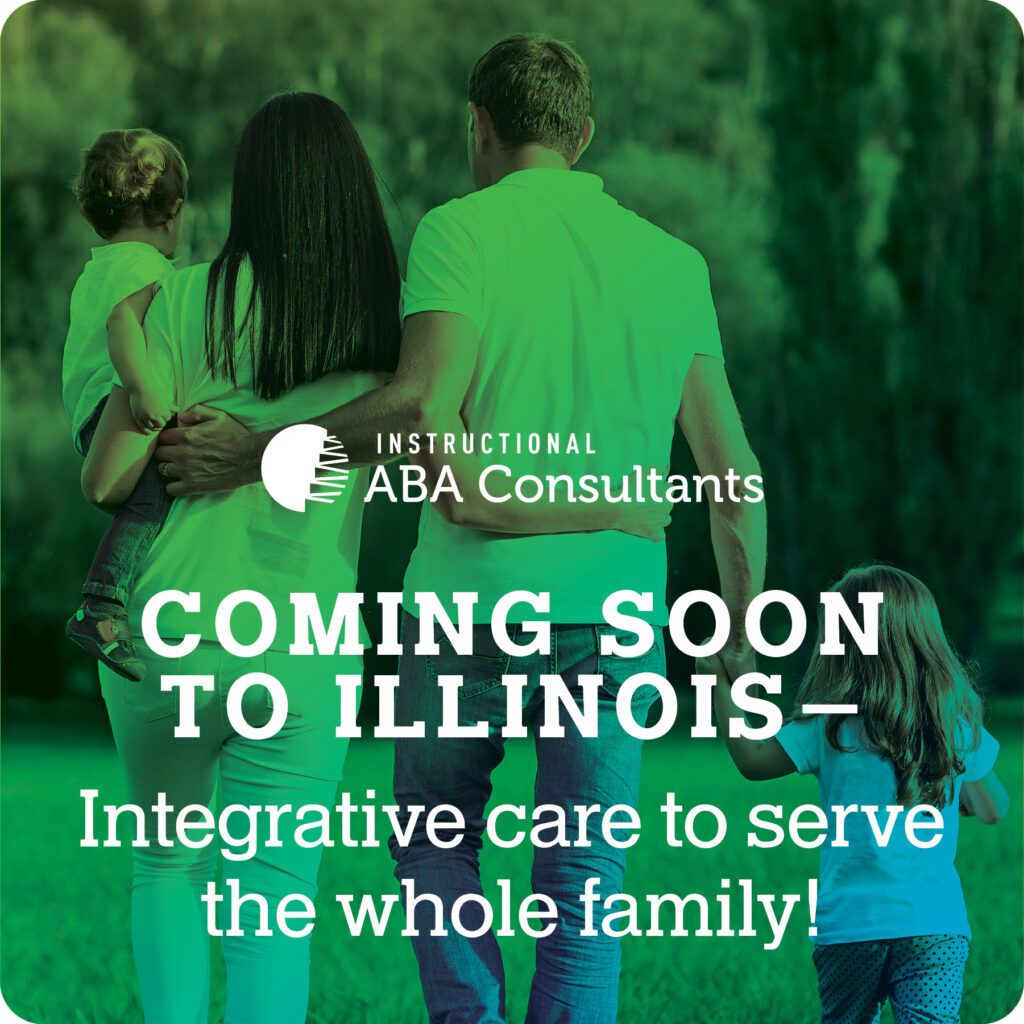
by IABA Team | Jul 26, 2022
Getting health insurance to cover certain needs can be a pain in many cases. Health insurance and autism, however, are in a category of their own.
The most recent data from the CDC estimates that 1 in 54 children will be diagnosed with autism–a number that seems to be increasing every year. Health insurance plans and policies are changing due to the prevalence of autism, but it can still be hard to get coverage.
Here’s what you need to know.
Getting an Autism Diagnosis
If you are concerned about the development of your child, speak to your pediatrician as soon as possible. Your pediatrician will be able to help you find a suitable professional to conduct an autism evaluation.
A diagnosis needs to be made by a licensed medical professional before insurance will offer any coverage (pediatric psychologist, developmental pediatrician). Many states have laws that require insurance providers to pay for autism evaluations. If you are unsure if your provider covers evaluations, be sure to speak to a representative to make sure.
After a diagnosis, you will get a prescription for services from the doctor, most likely for ABA therapy. You will need prior authorization from your insurance provider to get coverage for a new autism diagnosis/prescription before starting any programs.
Costs of Autism
According to the CDC children with autism have medical expenditures around $4,000-$6,200 more than a neurotypical child. On top of this, paying cash for an intensive inpatient behavioral program (20-40 hours per week) can cost around $50,000 per year.
Costs like these are why it is extremely important to know what your insurance provider will cover and what they won’t. If you currently have a family health insurance policy, it is best practice to call your provider and speak to a representative about your options.
Common Issues with Insurance Coverage & Autism
Many medical conditions and procedures come with ‘hidden strings.’ Autism is no different. Insurance plans often have policies in place that block coverage based on the type of service/therapy being used, the provider, or the health plan itself.
Common issues families face with insurance companies and autism coverage include:
- Coverage only specifies one type of autism therapy (usually ABA)
- Specific plans or therapies are denied coverage due to certain insurance plans categorizing some therapy coverage as being for disabilities only (not autism)
- Out-of-network providers are not covered in any way, even partially (it can be hard for some people in rural areas to find nearby in-network providers)
- Services not being covered due to a policy classifying them as ‘educational,’ thus not health care
Issues like these (and other related ones) need to be taken up with your insurance provider as soon as possible–preferably before any sessions have started. Also, be sure to talk to any provider you are considering about billing. Misbilling certain services can create an issue with your insurance provider–make sure the healthcare provider you choose knows their billing!
Autism, Health Insurance, & the Law
Each state has different laws and regulations regarding how insurance providers provide coverage for autism. The National Conference of State Legislatures has a great list of these laws, broken down by state.
The laws vary by state, meaning that some people may have trouble getting an insurance provider to cover a specific service–especially those who have recently changed residence.
ABA Therapy from IABA Consultants
If you have questions regarding autism treatment, education, or plans to use ABA therapy, we are here for you! Our goal is to make sure no family is turned away due to financial constraints. Our therapy team would love to talk to you. Find the location closest to you and give us a call. We’re here for you.

by Jessie Cooper | Jul 21, 2022
Two weeks ago, after the overturning of Roe vs. Wade, I wrote to you for the first time in months. I shared with you that over these past two years I had felt as though I’m living in purgatory. That life was going on around me while some very real and hard events surrounded both my personal and professional lives. I have also found gratitude and joy along the way, the light within a dark time in my life that has made it palatable to continue moving forward. It was the light breaking into darkness time and time again that reminded me it is our goodness and humanity that will create the change we all so desperately need.
What kept me frozen was having a front-row seat to see a corrupt system up close for so long. If I am ever able to share my personal experiences many of you would not believe me I am sure. Yet, if you have told me that as women (and individuals) we would lose the right to abortion and that making birth control illegal (in Ohio, where I am) is now on the table I would not have believed you.
There are people in power using their power to obstruct and restrict justice in widespread ways. These people in power have created an ignorance amongst the population to support their wide-reaching attempt to take control of our lives. Insidiously, like a frog boiling, the legal system of our control has planted fear in an attempt to keep us all small and steal our rights.
No. Fucking. Thank you.
Liberty and Justice?
In witnessing what has occurred and is now the reality of millions I say “there is more coming.” The overturning of Roe vs. Wade is the tip of the iceberg, the canary in the coal mine telling us that something is incredibly wrong with our government. As Amanda Doyle says, “The walls of our justice system will need to be rebuilt before we can have any type of roof.” The foundation of our country was liberty, yet the system is run by predominantly white men. Over 200 years later it is clear that this liberty was only designed for them.
It is painful to witness what has occurred in this country, what has been taken away, and the manner in which decisions are made. What I do know to be true is that if fear keeps us small and stuck, bravery can unearth this oppression. I also know quite personally that the fear feels paralyzing when your own safety and freedom are directly at risk. I have been told more times than I would like to admit that I turn into a controlling, crazy, type A bitch when speaking for my own safety and freedom. What I hate to admit is that I stayed in this gaslit narrative far too long and questioned my own behavior and what I was doing wrong. The answer was nothing. The answer is still nothing.
I listened to a We Can Do Hard Things podcast this week that featured Natalie Portman. I loved her before but now I know my girl crush is 1000% justified. Natalie didn’t speak as an actress, she spoke as a woman in a leadership position of her experience inside the industries she is involved in. During the podcast, Natalie reminded me that as women we are all facing prejudices if we dare to speak or lead. Natalie shared her experience that when she experiences gossip in the movie industry that it may be a red flag of an assault that may have occurred. That, if a director is saying a woman is a difficult actress, she listens closely, not to his words but to the warning, which basically says ‘this woman doesn’t put out.’
As women, we must listen to these warnings and speak out against abuse, tyranny, and the restriction of rights. That, if a woman is called a bitch, controlling, or difficult, we immediately think~what could have happened to her?”
Reshaping the Narrative
The gaslighting of our society and the hot and heavy fear breathing down our necks must end. We must stop the insanity of believing that, as women and/or individuals, somehow we are wrong, difficult, and overbearing after we simply speak our minds. While I agree with Amanda Doyle that we have new walls to build, I would like to add we have a few more to knock down as well.
Yes, these wounds are difficult to look at and these wounds tell us where to heal. Just like my once broken body, our country’s wounds tell us as a nation what we must fix.
I started writing this two weeks ago and didn’t know where to start; that it felt like too much. Then I remembered, “The Blueprints of Heaven are in the Hearts of Women.” All we have to do is face the fear, tell it, that it cannot keep us small, and demand our justice and the justice of our children. Side by side, arms linked, we can do this together.
Xoxo,
Jessie Cooper

by IABA Team | Jul 19, 2022
There are many types of therapy that can help with specific symptoms of Autism. One type of therapy that is often underlooked when it comes to treating ASD is occupational therapy (OT). In tandem with a solid ABA program, OT can have extremely beneficial effects on development.
OTs that specialize in helping children with ASD are able to evaluate the needs of a child and put a unique therapy program in place. Let’s take a look at what OTs do when it comes to helping those with autism.
Occupational Therapy & Autism
The first thing to go over is the skills that OTs can help individuals with autism learn. Skills OTs help with include:
- Cognitive skills
- Communication
- Motor skills
- Sensory skills
- Social skills
Each of these skills has specific ‘sub-skills’ OTs focus on:
- Cognitive Skills. Cognitive Skill training focuses on attention, mental stamina, and focus.
- Communication. Communication training focuses on speech and nonverbal communication.
- Motor Skills. Motor skill training focuses on balance, posture, and using objects/tools.
- Sensory Skills. Sensory skill training focuses on responses to sensory stimuli and sensory defensiveness.
- Social Skills. Social skill training focuses on emotional regulation, interacting with others, and behavior.
How Does Occupational Therapy for Autism Work?
Occupational therapy for autism is different from standard OT for several reasons. OTs with an autism-centered practice work with both clients and their families, making sure plans stick inside and outside of a clinical setting. OTs will help families understand any cognitive-behavioral approaches being used so they can continue at home.
Autism OTs emphasize mental health and well-being in order to make clients feel safe in the environment where therapy takes place. Occupational Therapy for autism often includes teaching self-care routines, so making clients feel safe both in the clinic and at home is essential for success.
Goals of OT for Autism
Like other autism therapy methods, OT focuses on helping a person with autism’s quality of life. The ultimate goal is giving clients as much independence as possible. The areas of life OT therapy for autism focuses on include:
- Independent communication
- Working with others
- Listening
- Gratification and delayed gratification for completing tasks
- Expressing feelings and emotions to others
- Creating and maintaining friendships and other relationships
While the goals of OT may seem to line up with the goals for most autism therapies, OTs are able to combine their occupation therapy training with ABA or cognitive behavioral training to create an occupational program perfectly suited to the needs of a person with autism.
ABA Therapy from IABA Consultants
If you have questions regarding autism treatment, education, or plans to use ABA therapy, we are here for you! Our goal is to make sure no family is turned away due to financial constraints. Our therapy team would love to talk to you. Find the location closest to you and give us a call. We’re here for you.

by IABA Team | Jul 12, 2022
Acetaminophen has always been the go-to drug for pain relief during pregnancy. Doctors often prescribed acetaminophen as an OTC drug for mild to moderate headaches due to the low risk associated with pregnancies. The widespread use of acetaminophen for pregnant women in pain, however, may be coming to an end.
Recent research conducted by both university researchers and the US National Institutes of Health links excessive acetaminophen use to autism and ADHD. While the conclusions of the initial studies need additional research for a definitive conclusion, the studies had eye-opening results.
Studying the Effects of Acetaminophen on Pregnancy Risks
A National Institutes of Health-funded study conducted by doctors from Johns Hopkins University called the Boston Birth Cohort Study was used for acetaminophen research. Part of the study examined 24,000 participants, 996 of whom were tested for acetaminophen levels and associated byproducts at birth.
The results of the study on acetaminophen were stunning. Children in the study were checked in on 8.9 years after birth. Of the 996 births, 25.8% had been diagnosed with ADHD, 6.6% had been diagnosed with autism, and 4.2% had been diagnosed with both. This correlates to 2.9X the risk for ADHD and 3.6X the risk of autism (compared to the lowest third of diagnoses in participants).
Researchers in the study noted the results supported earlier research linking acetaminophen to increased autism & ADHD risk during pregnancy. They also noted that future studies will be needed for a definitive conclusion. Some factors not used during the test (health of the mothers, preexisting conditions of the mothers, etc) may also need to be factored in for future research.
Is it Safe to Take Acetaminophen During Pregnancy?
This is definitely a question best left to your doctor. While the answer may be somewhere along the lines of ‘use very sparingly,’ some unanswered questions make this difficult to answer. Researchers and doctors are questioning and studying the impact of acetaminophen and other drugs taken early during pregnancy versus late in pregnancy.
Without conclusive research, there is no ‘recommended dose’ for doctors to prescribe. Talking to your doctor is the only way to get a good answer to this question. Your doctor knows you and your needs better than general internet information ever will. If you are experiencing pregnancy-related pain, please talk to your doctor before taking any OTC medications!
ABA Therapy from IABA Consultants
If you have questions regarding autism treatment, education, or plans to use ABA therapy, we are here for you! Our goal is to make sure no family is turned away due to financial constraints. Our therapy team would love to talk to you. Find the location closest to you and give us a call. We’re here for you.

by IABA Team | Jul 5, 2022
Long trips and vacations with kids can be difficult. Keeping a child occupied and calm during a trip requires patience and preparation. Keeping a child with autism occupied and calm during a trip may require some extra patience and planning.
This article is going to go over tips, tricks, and good general information on traveling with an autistic child. The two sections in this article will include information on road trips and air travel, as both have unique challenges.
Tips for Flying with a Child with Autism
Air travel is a big change for any child with autism. The sensory overload that accompanies every flight can be a huge challenge. The noise, the pressure, the small area, and the regimented process are all obstacles that a family will need to prepare for before a flight.
Before flying with an autistic child, you will want to consider taking the following actions:
- Prepare Weeks (or Months, if possible) Ahead. Talk with your child’s therapist or doctor about how to best start the process of preparing for a flight. Getting a plan together early on will help remind you about things you may need to prepare your child for.
- Create a Calendar. Having a visual indicator for your child to see indicating the upcoming trip can help them prepare for the change.
- Talk to Your Child About the Flight. Go over all the information about planes, airports, and travel you have planned with your child before the trip. Ask your child questions about the trip and make sure they have an understanding of the upcoming trip.
- Pack Essentials. Make sure to pack any of your child’s favorite toys, activities, and snacks before the flight. Remember that liquids over 3oz. cannot be brought through airport security!
- Pack Entertainment. Make sure your child has their favorite long-term toy or activity-packed. Focusing on something they love can make the long trip seem much shorter.
- If Your Child Has Special Needs: Talk to the Airline or Airport Before Your Flight. If your child needs special treatment or has other needs not normally provided or permitted by airlines, make sure to call them as early as possible! Airlines can be very accommodating, so make sure to talk to your airline about any and all of your child’s needs.
- Do a Practice Airport/Airline Security Run. Talk to your child’s therapist or pediatrician about the best ways to simulate an airport or airport security. Devise a plan and make sure your child is as prepared as they can before the real thing.
Road Trips & Autism
Taking a trip or going on a car vacation is much easier than flying for a child with autism. This doesn’t, however, mean it will be a walk in the park!
Leaving home and routine behind is difficult for children. Taking a child with autism out of an expected routine and schedule will take some preparation to mitigate emotions.
Just like with flying, there are some things you can do prior to a road trip to help ease the apprehensions of your child:
- Create a Calendar. Giving your child a visual indicator for when they will leave home can help them understand when the trip will start.
- Talk to Your Child & Communicate the Trip Plans. Creating an understandable narrative around where & why you are traveling can help your child understand what is happening. Ask them questions about the trip, answer their questions about the trip, and be sure to emphasize the things they will enjoy!
- Have Your Child Help Prepare for the Trip. Helping mom or dad is always fun, especially when it’s for something special. Having your child help you with packing or preparing the car for the road trip may be a great way to imbue an understanding of what to expect.
- Show Pictures of Hotels or Houses You’re Staying At. Make sure to familiarize your child with your destination and what they can expect when you get there. If you are staying with relatives, contacting them to prepare a room, followed by sending pictures of the prepared space, can make your child understand where they are staying is safe.
- Pack the Essentials. This is imperative for any road trip–a car has fewer accommodations than a plane, namely, there are no snacks & no bathrooms. Be sure to pack all of your child’s favorite toys and activities along with a cooler filled with favorite snacks & drinks.
- Schedule Gas Station/Rest Area Stops. Letting your child know when you will be stopping can help them understand the length of the trip. Creating a visual calendar of stopping times/points can help even more.
Make sure to make your car as comfortable as possible for any road trip. Bringing favorite comfy blankets or pillows can help your child feel more at home in the car.
ABA Therapy from IABA Consultants
If you have questions regarding autism treatment, education, or plans to use ABA therapy, we are here for you! Our goal is to make sure no family is turned away due to financial constraints. Our therapy team would love to talk to you. Find the location closest to you and give us a call. We’re here for you.

by Jessie Cooper | Jun 30, 2022
Over the past two years (and counting) I have lived through events that have bore incredible pain, as many others have. If you had asked me in March of 2020 if even a fraction of what I experienced would occur I would not have believed you.
I often have described these past two years as purgatory or limbo; life was going on around me but I was stuck in time. Event after event transpired yet the hardship of my own reality was unchanging. During this time, when the universe dealt me that painful set of cards, I was reminded that through our wounds we heal.
I couldn’t stop several grievous events from happening or even prevent how other people were treating me. What I could do is pay attention to the loving & extraordinary people in my life, love myself with my whole heart, heal, and witness the system around me. It was through this process that I was able to start healing my wounds. It was also through this process I saw how damaged our legal system and many related parties are.
The Injustice of the Justice System
I witnessed how power, control, status, money, and fear are the status quo. At first, I fought and screamed against this. Then I realized that the screaming only made it worse. This is how I learned to witness–to surrender–to the system that would now make life-changing decisions for my life and my children’s lives. I realized freedom I thought was mine I never really had in the first place–I was just privileged enough not to have to enter the system before.
Waking up this past weekend to the rights of women being stripped away across the country was sobering but not surprising. Through my own witnessing and observance of our legal system in action, I am able to see this for what it is. As I’ve said before and will say again; power, control, status, money, and fear.
It is sickening to think that these base human qualities are making decisions restricting the rights of women, yet it is our reality. While the restriction of abortions is by far the largest power play we have seen in decades, power plays to remove our rights and increase the wealth & control of others have been happening in front of our eyes for decades.
Staying Positive
I still believe that the majority of human beings are good and have more in common than not. Yet so many of us have become disconnected (myself included) from the legal system and the politics around us. I don’t know about you but the word ‘politics’ comes up and my gut reaction is to tuck and roll; to avoid the conversation. My instinct to avoid the conversation is because, to me, politics equals arguing and conflict that ends up with inaction and everyone upset at Thanksgiving.
I wonder now if this wasn’t a ploy to keep us all away from the system, to keep us away from being a part of the conversation? Seeing what I have seen now, I wouldn’t put it past anyone in a position of power in our country. Because if we are all fighting with each other we are not paying attention to them and when we’re not paying attention elected officials who have no right to lead us, let alone speak for us, are running the country for their own selfish gains.
What if we all paid attention? What if we all listened to each other? What if we all stopped arguing and began to witness the system in front of us for what it is? Could it change? I think it could. I also think, much like my own experience, bearing witness may be painful because we will have to look at the wounds of our country. We will have to ask, “Baby, where does it hurt?” We will have to listen to the oppressed, listen to the wounded, and hold space for each wound so we know what needs our attention.
Broken System, Unbroken People
The system is broken, overrun with greed. But we are not broken. We, the people beneath the system. The overturning of Roe vs. Wade is a national wake-up call, shining a light on people in power who should in no way be in power. Six people took away the rights of millions. Six.
I do not know where to start, truly I have to google it. What I do know is that being a bystander in our country is no longer an option. The conflict of politics is not an excuse not to get involved. I can no longer say it’s not for me because this system is taking away my, your, and our children’s freedom. It will require strength, care, and humility. It will require knowing ourselves so we know what we will and will not stand for. It will require learning and unlearning. It will require kindness, strong boundaries, and grace. Trying and failing, then trying again.
Wounds allow light to come into the darkness when we are brave enough to heal them. “Hate, it has caused a lot of problems in the world, but has not solved one yet.” -Maya Angelou. We can either spend the rest of our lives fighting with each other about disagreements, differences, and what we do not want in our policy or we lean into love, listen, take action, and ask what we want. There is kindness in so many of us, our love is stronger than hate. We can make a change we want to see but it will take all of us.
Be brave, band together, listen, heal, and move to action. Be the change you want to see.
Xoxo,
Jessie Cooper





